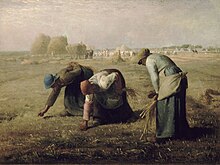Classical economics
economic thought
(Redirected from Classical economists)
Classical economics asserts that markets function best without government interference. It was developed in the late 18th and early 19th century by Adam Smith, Jean-Baptiste Say, David Ricardo, Thomas Malthus, and John Stuart Mill.

Quotes
edit- Until recently, economists have not been particularly carried away with concern over environmental problems caused by industrial development. Just as in the other sciences, the few economists ...who have always sounded the alarm ...are somewhat out of the mainstream. These humanist concerns seem to have gone out of style after the age of classical economics. Even the conventional analytical models of contemporary economics seem to prefer to exclude these concepts by ignoring them entirely or by shunting them off into their own branch, called "economic externalities." These externalities include any “given” or windfall factor, such as the availability of transportation, technological know-how, a labor force, or resources, factors that are not themselves directly involved in the economic analysis of markets and businesses. For example, the regularly bright and sunny weather of Hollywood was considered an external economy of the movie industry there. The movie moguls, no matter how tyrannical, could neither turn on nor turn off the sun. But as the surrounding community grew and the smog thickened, the weather became an external economy. In very recent years concern over these economic externalities has grown. The environmentalists are beginning to be included in the mainstream. The literature is growing, and professional meetings include sessions on environmental economics. Attempts are even being made to extend the theoretical framework to include the changes in the environment caused by economic activity. [...] The Materials Flow of the Economy... sees the human race living on a 'space ship earth' in which all the inputs and outputs, all the original resources and all the final wastes, must be accounted for. Furthermore, when the materials are returned in the form of smoke, sewage, garbage, junk, heat, noise, and a wide variety of noxious gases, the world becomes a very changed place — and the change is seldom for the better. Implicit in this materials flow concept of the economy is that the less production that is needed to maintain an adequate level of affluence, the better. An efficient economy is one that gets big results with little effort. More industries, more mines, more businesses, more employment, and more consumer goods do not always mean more well-being... because all these also mean more destruction of our natural resources and despoilation of our surroundings.
- Martin Gerhard Giesbrecht, The Evolution of Economic Society: An Introduction to Economics (1972) Ch. 10, The New Dimensions of Mature Economies, pp. 321-322.
- Alongside their work on pure economic theory, the classical political economists engaged in a parallel project: to promote the forcible reconstruction of society into a purely market-oriented system. ... Most people in Britain did not enthusiastically engage in wage labor—at least so long as they had an alternative. To make sure that people accepted wage labor, the classical political economists actively advocated measures to deprive people of their traditional means of support. ... Perhaps because so much of what the classical economists wrote about traditional systems of agricultural production was divorced from the seemingly more timeless remarks about pure theory, later readers have passed over such portions of their works in haste. ... I argue that these interventionist recommendations were a significant element in the overall thrust of their works. Specifically, classical political economy advocated restricting the viability of traditional occupations in the countryside to coerce people to work for wages.
- Michael Perelman, The Invention of Capitalism: Classical Political Economy and the Secret History of Primitive Accumulation (2000), pp. 2-3
- The classical economists were brilliant and creative minds who, if reborn among us today, would soon forge to the peak of our profession. But they lived in early times and had no access to the scientific knowledge and know-how that has accumulated over the centuries. Therefore, a modern graduate student is expected to improvise a more accurate account of the incidence of export subsidies than any classical writer ever managed to fabricate. In order to adjudicate the merits of the Ricardo and Smith litigants, I ought first to sketch a tolerably accurate, modern account of the incidence process.
- Paul A. Samuelson, "The Overdue Recovery of Adam Smith's Reputation as an Economic Theorist", in M. Rey (ed.,), Adam Smith's Legacy (1992)
- In general the claim can be supported that a view of classical political economy as committed to extreme laissez-faire or unmitigated economic individualism misrepresents or at the very least analytically overgeneralizes their circumscribed theoretical and practical aims. In general then, with regard to both political and economic liberty, the classical political economists might be seen to be united in their efforts to theorize and systematize the productive and allocating functions of the mechanism of the market as the most efficient means to engender the growth of wealth. At the same time, classicals such as Smith, Malthus, Ricardo, and Mill recognized that the market, of necessity, operated in a larger context of restriction – not only legal, but equally as important, within political, religious, moral, and conventional restrictions – which could not be readily or in some cases even desirably overcome.
- Shannon C. Stimson, "Classical Political Economy", in Coole, Diana H.; Gibbons, Michael; Ellis, Elisabeth et al., The encyclopedia of political thought (2014)
External links
edit